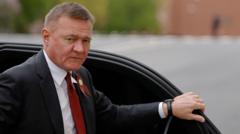Putin's appearance in Kursk follows Russia's military reclaiming of territory, highlighting the complexities of civilian struggles and governmental responses in the wake of conflict.
Putin's Kursk Visit: A Symbolic Reassertion Amid Ongoing Conflict

Putin's Kursk Visit: A Symbolic Reassertion Amid Ongoing Conflict
Russian President Vladimir Putin's recent visit to Kursk signals both recovery and lingering challenges within the wartorn region.
Russian President Vladimir V. Putin made his first visit to the Kursk region since Russian forces successfully regained territory lost to Ukrainian troops during a surprise incursion last year. The Kremlin reported that Putin toured a nuclear power plant under construction and met with volunteers aiding conflict-impacted residents. The visit appears to serve as a strategic effort to convey a sense of normalcy, despite continued clashes in the area.
In August, Ukrainian forces had seized approximately 500 square miles of Russian territory in Kursk, marking a significant advancement in the conflict. However, after initial successes, their momentum slowed, leading to Russian reinforcements counterattacking and reclaiming most of the territory by March. This scenario shifted the balance, with both parties suffering considerable military and civilian losses over nine months of fighting.
As peace talks resumed between Russian and Ukrainian officials for the first time in over three years, Putin's visit also represents a response to previous statements where he conditioned negotiations on Ukraine's military capitulation in Kursk. Notably, nearly 300 Russian civilians have reportedly died in the region, with an estimated 110,000 displaced, reflecting the human toll overshadowed by state-sponsored narratives that minimized the war's impacts.
Despite official reports, the lack of independent verification into civilian casualties has raised questions about the actual severity of the humanitarian crisis, particularly given restricted access for journalists and researchers. Many displaced individuals have voiced grievances about insufficient governmental support and the perceived apathy of broader Russian society towards their plight.
To address these concerns, Putin announced intended stipends of $800 a month to residents of border settlements during discussions with local government officials. This initiative aims to alleviate some hardships faced by civilians, further emphasizing the Kremlin's efforts to project an image of control and care despite the ongoing challenges posed by the ongoing conflict and its repercussions.





















